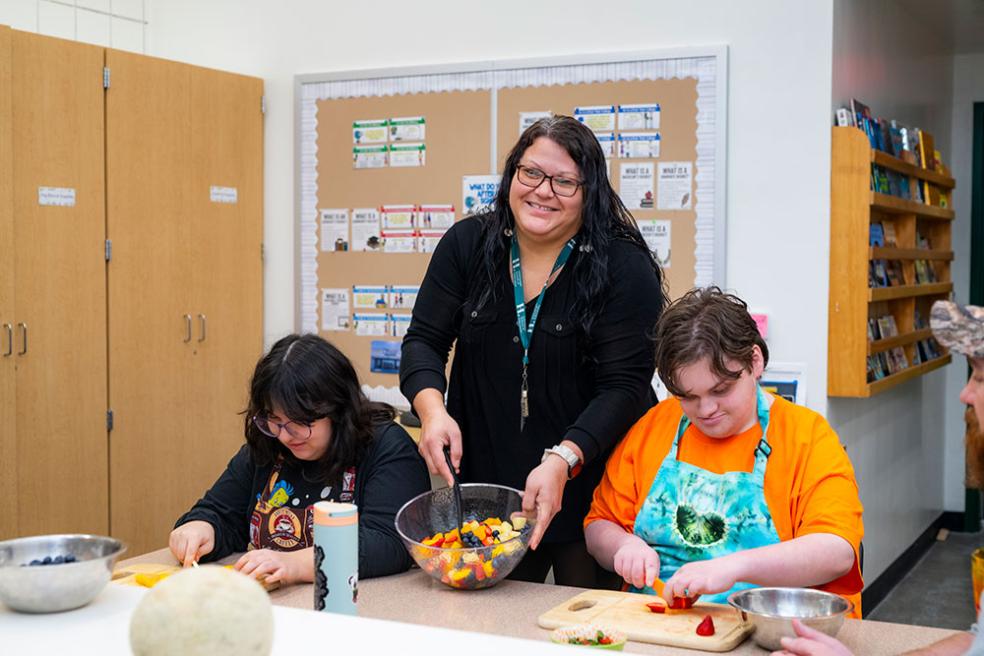
To help fill gaps and train future educators, state officials created the California State Teacher Residency Grant Program. With $800,000 in support from this grant over a period of four years, Cal Poly Humboldt—which started as a teacher’s college in 1913—created its Special Education Residency program. The program was built in partnership with the Humboldt County Office of Education (HCOE) and local school districts in 2018.
The program is designed for students in Cal Poly Humboldt’s Special Education (SpEd) credential program. Modeled after physician residencies, the program partners future educators with highly qualified teachers in TK-12 schools for one year, giving resident teachers the necessary hands-on classroom experience needed to earn their credentials while also getting paid to do it. So far, more than 50 students have completed the residency since its inception more than six years ago.
As a direct result of this program, more teachers are employed in regional schools. In fact, 95% of program graduates between 2018-2022 became teachers in local schools, explains Bernie Levy, SpEd program coordinator.
Before the residency was introduced, most of the teachers trained here left. After, most have stayed, Levy explains.
The professional and financial support gained through this residency has proved pivotal for aspiring teachers.
“A lot of people want to become a teacher but can't afford it,” Levy says. “This has been a game changer for many.”
For residents like Valerie Canfield, it’s made all the difference.
“As a single mother, it would have been very hard to work full time as a student teacher with no compensation,” she adds. “If I did not have this program and the support of the staff at Cal Poly Humboldt, I would likely not have been able to pursue my SpEd credential.”
Canfield is currently completing her residency at Eureka High School where she works with students ages 18-21 in the Transition Life Skills class. She was inspired to pursue her SpEd after working as a substitute teacher.
“I grew a passion for students with unique needs and saw the need to help advocate for these students, promote inclusion, and work collaboratively with students and their families,” she says.
The program provides a pathway to earn a credential for those who may already be working in the field. For many, it’s an opportunity to advance their careers without leaving the schools and students they’ve already built relationships with.
Morgan Myrick is one such educator who found both financial stability and professional growth through the program. Throughout his residency, which he completed in 2024, he maintained his position as an aide at Glen Paul School.
“I do not think that I would've been able to pursue teaching as a career without the ability to maintain my position as an aide and provide for myself financially,” he says.
“It was very rewarding to be able to grow as an educator and apply what I was learning at the University with students that I already had the connections built with,“ says Myrick, who now works as a Resource Teacher at Pacific Union Elementary.
The support from mentor teachers, administrators, and the school helps residents establish strong foundations, encouraging them to stay at the school district where they trained, says Levy. The model also allows aspiring teachers to build lasting relationships—an important factor in creating stable and effective learning environments, and promoting job satisfaction.
Educators who complete such programs are more likely to stay in the profession, says Levy.
“I look forward to coming to work every day,” says Canfield, who credits her mentor teacher for continually inspiring her. “She is very knowledgeable and always has various methods and ideas on how to instruct students effectively and she always has so much enthusiasm. I have been able to gain confidence in my abilities as a teacher with the support of a great team.”
A Humboldt County native, Canfield has a strong desire to give back to the community. “I want the opportunity to help children that need that extra special person in their corner. It’s amazing how much of a difference the right support system can make,” she says. “The impact of a caring and skilled educator can be life changing for students and their families and I want to help give students as many opportunities for their future as possible.”
As California continues to struggle with a shortage of special education teachers, programs like this one are proving that investing in future educators not only fills vacancies but strengthens communities.
“It's a highly effective program,” says Sheila Rocker Heppe, the Northern California Hub Lead for the Statewide Residency Technical Assistance Center (SRTAC) with the Commission on Teacher Credentialing. “Statewide 88% of teachers who earned their credential through a residency program are still teaching two to three years later. That's just unprecedented. In Humboldt, that number is even higher.”
The Special Education residency program is so successful that the HCOE committed to continue funding the program after the state’s initial investment. In addition to the SpeEd residency, the University also offers a separate residency for those seeking single-subject credentials. That residency has become a model for others and has expanded to offer Cal Poly Humboldt residency programs to students in Kings and Tulare County through the Teacher Residency for Rural Education.
“The “magic” of a residency program is the opportunity for someone to remain in their community and work in a local school setting while earning their credential in high-quality teacher education programs online, And they earn a stipend,” Rocker Heppe. “For this reason, residency programs provide a much needed solution to the teacher shortage crisis in rural areas across California. Cal Poly Humboldt is a leader in this important work.”
For more information about the residency or to apply, contact Bernie Levy at (707) 826-5795.